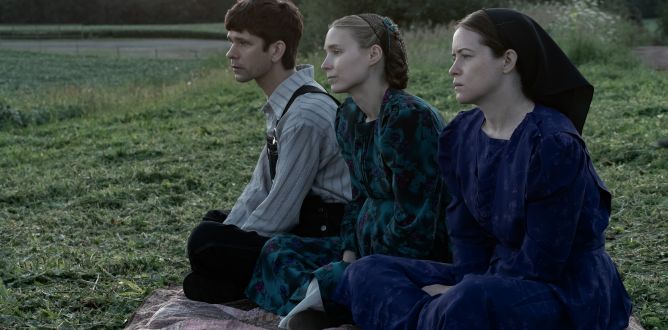Women Talking Parent Guide
Doing nothing is not an option.
Parent Movie Review
There is one thing that all the women of a remote Mennonite colony have in common: rape. For years, a group of men drugged and violated them as they slept. They awoke in the morning with fading memories and blood and bruises on their thighs. Gaslit by their religious leaders, the women have been accused of overactive imaginations or of sexual congress with ghosts or Satan.
Now the women have caught the abusers, but their leaders are bailing them out of jail and give the victims two days to respond to an ultimatum: forgive the rapists or be excommunicated from the colony and forever barred from the kingdom of Heaven.
Faced with this choice, the women hold their own vote and select a group to decide which of two paths they will take: leave the colony of their own volition or stay and fight. The women who meet to discuss the options are a varied lot, despite the apparent sameness of their lives and attire. Salome (Claire Foy) is consumed with rage over her own assault and the rape of her four-year-old daughter and yearns for vengeance. Ona (Rooney Mara), is bright, curious about the wider world, unmarried, and pregnant with her attacker’s child. Mariche (Jessie Buckley) is furious with the husband who beats her and her children but is terrified to lose the security and familiarity of her home. Mejal (Michelle McLeod) has acquired a smoking habit to control the anxiety and panic attacks that consume her. Bringing wisdom, faith and perspective to the group are Agata (Judith Ivey) and Greta (Sheila McCarthy), older women who have their own grief and guilt to confront.
There is no denying that Women Talking is a difficult film to watch. After all, this is a movie about rape and although no assaults take place on screen, flashbacks show women coping with the aftermath of their own violations and the abuse of their children. This is a gut-wrenching movie that will make you weep and seethe in equal measure. (If you have a history of trauma, please consider your comfort level with distressing material before you choose to watch the movie.)
Women Talking also an intensely thoughtful film. These remarkable women are largely illiterate but they are not afraid to delve deeply into the issues that shape their lives. They discuss the kind of society they want to live in, the protections they want for their children, their own complicity in perpetuating the violence of their community, and their need to support one another without judging. They are also women of faith, and their convictions are a guiding light in their decision-making. Far from mindless followers, these women are full of questions about the nature of forgiveness, the effectiveness of forced forgiveness, and God’s love, vengeance and omnipotence.
Fortunately, the cast is up to the challenge of bringing their complex characters to life. All of the gifted actors bring their characters to life, with every shade of emotion – pain, grief, scalding rage, serenity, faith – visible on screen. The real weakness of the movie is that its script isn’t as good as its cast. The women are believable, but their dialogue is sometimes clunky, occasionally seeming to have emerged from a workshop in a women’s studies class. This is a common weakness of issue-based films and although I wish the script were better, the movie is still well worth watching.
Women Talking is a real-life horror movie, made all the more frightening because it’s based on real events. Hopefully, this film will get both men and women talking about how to create a world that offers safety, respect, dignity, and equality for all, regardless of gender.
Directed by Sarah Polley. Starring Rooney Mara, Claire Foy, Jessie Buckley. Running time: 104 minutes. Theatrical release January 13, 2023. Updated January 22, 2024
Watch the trailer for Women Talking
Women Talking
Rating & Content Info
Why is Women Talking rated PG-13? Women Talking is rated PG-13 by the MPAA for mature thematic content including sexual assault, bloody images, and some strong language.
Violence: The drugging and raping of women and children is a central theme of the film although no assaults are shown on screen. A small child cries from pain that lingers after an assault. A woman attacks a man with a scythe. Women are seen with blood and bruises on their thighs and with blood on their clothes and bedsheets as well as with blood dripping from their bodies on to the floor. A woman is pregnant as a result of a rape. A teenager smears her walls with blood after she gives birth to a baby who dies. It is suggested that a pregnancy results from incest. There is mention of a past suicide by hanging and a person contemplates suicide with a firearm. A teenager pretends a suicide attempt but it is meant as a joke. A woman and her daughter are seen after being beaten by their husband and father: the girl has bruises on her face; her mother is bruised, has a swollen eye, and has her arm in a sling. A woman talks about killing rapists. A woman bloodily loses teeth.
Sexual Content: Rape is a central theme of the movie: women revisit the aftermath of their assaults in flashbacks. A character wonders if her pregnancy is the result of incest. A transgender character transitions from female to male.
Profanity: There are two sexual expletives and a scatological curse in the script.
Alcohol / Drug Use: There is discussion of women’s experience being drugged and then raped. A woman uses a tranquilizer to sedate her non-compliant child. There are occasional scenes of smoking: a main character relies on cigarettes to control her post-traumatic anxiety.
Page last updated January 22, 2024
Women Talking Parents' Guide
Does your family’s religious tradition include a history of colonization or settlement? How did it affect your family? What impacts did it have on the other inhabitants of the area?
How are the women in this film affected by the fact that they are foreigners? Is it their national status or their religion that gets in the way of finding help when they need it?
For more information on Mennonites and their network of colonies, as well as real world challenges of rape and child abuse, you can read these articles:
Wikipedia: Mennonites
Mennonite Church USA: Who Are the Mennonites?
CNN: Meet Belize’s secluded Mennonite, a community frozen in time
BBC: The rapes haunting a community that shuns the 21st century
The Guardian: “The work of the devil”: crime in a remote religious community
National Geographic: Step Back in Time With the Mennonites of Bolivia
You can learn more about the author, Miriam Toews, here: The New York Times:
Miriam Toews’s Mennonite Conscience
Loved this movie? Try these books…
Women Talking is based on a novel of the same name by Miriam Toews, a Canadian author who was raised in a Mennonite community in the province of Manitoba. Other well reviewed novels by Ms. Toews include A Complicated Kindness and All My Puny Sorrows,
Home Video
Related home video titles:
She Saidtells the story of the reporters who broke the Harvey Weinstein story which catalyzed the #MeToo movement. The real-life sexual harassment of Fox News journalists is depicted in Bombshell.
A Nigerian university student faces a daunting search for justice when she is sexually assaulted by a professor in Citation.
Sexual violence, homosexuality, and conservative religion come together badly in Boy Erased.
MASS is another thoughtful film that explores the aftermath of violence. In this case, the movie brings together the parents of a school shooter with the parents of one of his victims to explore the causes and effects of their shared nightmare.
Mediated group discussions are used to resolve the contentious issue of school integration in The Best of Enemies.


